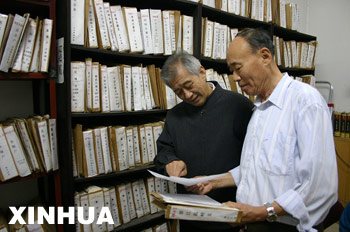Some positively believed that revising the family tree was just dredging up the feudal past. In 2000, CGCC Office Manager Kong Dehong went to visit a group of descendants in Taixing, in Jiangsu Province. But when he got there they chased him away. "They wouldn't let us in and refused to register in the genealogy. As we were leaving, they shouted ‘We won't register, but we will never forget our ancestor!'" Kong said.
Another problem was that to collect funds for the project people were charged five yuan to have their names included. Many, however, suspected that it was all a con-trick.
Kong Deyong says they were not aiming to restore the feudal system but simply to preserve an important aspect of China's cultural heritage. The Confucius Genealogy is in once sense just a family affair, but it has a long-standing and significant position in China's history. It would be a great loss if it were not recorded. Family histories are important and useful historical records, comparable with national and local archives.
Xu Shixuan, a researcher at the Chinese Academy of Social Sciences, agreed that long-term family trees are of significant reference value for social research in demography, the study of names, folklore, ethnology, the clan system, changes in family structure over time, and migration, and added that the revised edition of the Confucius Genealogy would be a valuable resource.

|
|
Editors of the Confucius Genealogy checking details of descendants of the great sage.
|
Women, minorities, overseas descendants included
For the first time, women, members of national minorities and overseas descendants have been included in the genealogy said Kong Dewei.
Having women in Confucius' genealogy is a first for the Confucius clan, but also a rarity in the history of genealogy in China where a centuries-old mentality – derived in part it has to be said from Confucianism itself – has traditionally valued men and disparaged women.
In 2003, Kong Kaiping became the first woman to have her name included in the Confucius Genealogy.